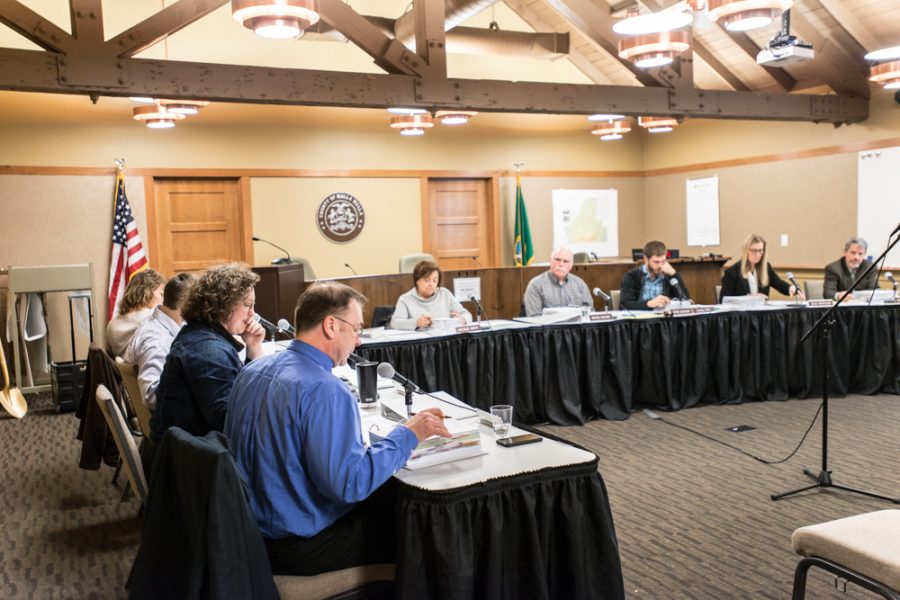The Pioneerrecently sat down with local author Everett Maroon, whose book “Bumbling into Body Hair: A Transsexual’s Memoir” was published in March. It tells the story of Maroon’s transition candidly and humorously. “Bumbling into Body Hair” was a finalist in the Pacific Northwest Writer’s Association’s 2010 literary contest for memoir.

Maroon also blogs about writing, relocating to Walla Walla from Washington D.C., and raising a baby son at trans/plant/portation. He has written for Bitch Magazine; GayYA.org; “I Fry Mine in Butter,” a blog about popular culture; RH RealityCheck and Remedy Quarterly.
The Pioneer: Describe your life prior to transitioning. How did you identify in the years prior to transitioning?
Everett Maroon: There were 33 of them. I’ll start with year one. Laughs. As I said the other night, I see myself as having a pretty typical middle-class childhood in the seventies and eighties. I did note at a pretty early age, around third grade or something, in primary school, that I felt different. When you hear your friends talk about how they’re experiencing the world and not everything resonates with you, it’s difficult or challenging for a kid who doesn’t have all the tools that we adults have to express their feelings and work though intellectual issues, especially ones that are about their own identity. It’s difficult for them to come up with what exactly is going on, so on the one end I was a pretty happy person for most of my growing-up years. I did have to deal with the odd bully here or there, but everyone does pretty much. I did note though that there was some sort of alienation that I felt from my same-age peers growing up, and as I got older and older, [I tried] harder and harder to identify what those things were.
I did identify as queer for a while, like 15 years, then I figured out that it wasn’t an orientation issue; it was a gender issue, a gender identity issue. I was in school, and then I went on to college, and straight to graduate school because I was afraid of what the real world would present. Then I found myself in a career that was somewhat interesting and stressful and rewarding. It was only when I picked up my head in the middle of being a very busy 30-something that I had this string of . . . first it was a sense that something still wasn’t falling into place for me, and then it became a series of realizations.
Pio: What is your academic background and career?
EM: I have a bachelor’s in English Textual Studies and psychology, so a double major, from Syracuse University, which I love to call a top tier II school. Laughs. Then I went to a master’s program, also at Syracuse University, also in English literature. Then my career became something completely different. I started off just taking a job just to get out of Syracuse. I moved down to D.C., and that was to be a book buyer for George Washington University.
I spent six months basically unemployed, and then fell into this job with a management consulting firm that worked with a lot of different government organizations. I worked my way up and got something like six promotions over a seven-year period, and eventually became a project manager there. That was one of the best jobs I ever had in my life, was working for that company. Then I went and worked for the federal government, working at the headquarters of the social security administration, and at this point what I was doing was evaluating web-based information systems, which sounds extremely dry, but you get to interview people using computer systems, which to me is really pretty fascinating work.
Pio: Why did you decide to transition and why did you decide to begin the process when you did?
EM: Again, going back to people when they’re growing up, it’s easy to identify “Gosh, I feel different” but it’s very difficult, or it’s a very different process, to identify what the difference is and then figure out what to do about it. For a long time I didn’t get that it was a gender identity issue. It took me until 2003 to figure out, “Oh, that’s what’s really going on with me.”
At that point then a person is left with several options. Ignore it. That usually doesn’t work. Try to go some sort of self-medication, self-directed way of eliminating the [feelings] or mediating them or something. That usually doesn’t work. I realized straightaway, “Gosh, what I need to do is talk to a therapist who will be unbiased, who won’t be a friend that I need to worry about telling all these thoughts to, who can reflect back to me what some of my options may be, and help me work through what may be a really destabilizing realization at the same time that it’s really exciting”––’cause once you have an explanation for what you’re feeling, there’s a lot that’s really positive about that, but when the explanation is “Well, you may need to turn your whole world upside down and transition to some other gender that you currently aren’t”––that’s an overwhelming prospect.
I guess I came to the conclusion I came to in my own time. I am happy that some people can come to that point much more quickly than I have done, and then there are a lot people who do this in their 50s and early 60s and even older that I’ve met.
There was an L.A. sports columnist who famously transitioned to female from male, and she wrote at the time, “The thing about transsexuality is you fight it, you fight it, you fight it, and it eventually wins every time.” The sad news about her is that she de-transitioned, and then later committed suicide. That’s one of the sad stories that happened in the population. I’m really not going to worry that I was 33 when I started thinking about these things. I’m just happy I’m here and live a good life. There’s a lot to be thankful for from my perspective.
Pio: Can you explain the difference between the terms transsexual and transgender?
EM: The first thing to say is that all these terms are contested. They’re up for debate. People don’t agree. They change over time in terms of the meaning, in terms of the connotations associated with them, and the general way in which we use them. That said, my understanding is that transsexual is a more narrowly defined term that describes a person who was assigned one sex at birth and through their own decision-making process and their own emotional work then moves to the other category of gender, or of sex really. That said, within that there are people who see their transsexualism as simply a medical issue. There are other people who would describe it in slightly different terms, more open terms. I’m not going to say that one is better than the other, or that one is more correct than the other, because my whole shtick is that we’ve got to let people name for themselves, define for themselves who they are, and we’ve got to stop weighing one subgroup or one definition over another.
Transgender can mean, is commonly used to mean, someone who has done the same thing that we use transsexual for, but it is also a more encompassing name for a category of people who are gender-nonconforming. Transgender can be used to mean someone who doesn’t identify cleanly with the sex they were assigned at birth but doesn’t want to use hormones or surgery to move to the other pole, or it could mean someone who cross-dresses as a fetish but not as an identity. They still maintain their gender identity even though they have a behavior of dressing in the opposite sex’s clothes. Obviously, when we say this we don’t mean women wearing pants. They usually mean men wearing dresses or wearing women’s undergarments. Transgender encapsulates all different kinds of people, and therefore it has become in some circles a negative term. It detracts from transsexual rights, so there’s a debate between those two terms.
Pio: On your blog you describe gender as “ludicrous, impoverished, and problematic.” Can you elaborate on that?
EM: Again, if someone doesn’t know my status, and they walk up to me and say something like “women are all so ‘x,'” you know, whatever it is––to me that’s a ludicrous moment related to gender. They are saying this to me as if these gender categories are pure, essential, natural, normal, etc., and they’re saying it to some trans guy. If I were to reveal to them, “you know, well I must be pretty stupid then too, because I come from planet ‘X,'” then that’s to me a ludicrous moment.
[Among] other things that I’ve experienced [is] this idea that men have to communicate in certain ways when they’re speaking with other men. Whereas I have all this history of being able to say whatever is on my mind, let’s just say at work or something, so I know that people can converse in a different way than just to talk about the weather, or sports, or cars.
When I was working at Social Security, there was a while there, where I would come home and just be like, “I love football, but I can’t have another conversation about football.” It was just clearly like a placeholder for an actual conversation, so if someone seemed frustrated about the day at work what they would do is talk about sports as a vent for their frustration as opposed to saying, as many women are capable of saying, “God, I’m really frustrated.” That to me seemed pretty ludicrous. Why are we damping down men’s communication? There’s this whole thing that women are too emotional and men are rational, but there’s a loss there if men are only this thing too. I’m not going to get on the bandwagon of men’s rights or any of that stuff, but I’m saying that to me, that is ludicrous. We are all capable of different kinds of communication, and we should all be supported in communicating in the most honest and direct way possible, as opposed to these strange, oozy side conversations.
Pio: What part of your life does “Bumbling into Body Hair” cover?
EM: It really covers something like a five-year period from after I first started thinking about my own gender identity and all my own hesitation and nervousness about transitioning, and working through what was going to kind of resonate the best for me and my life, and then coming out the other side of that process. It’s the story of a mid-30-something person struggling with waking up and realizing that my life had somehow gotten away from me and what could I do about it.
Pio: Why did you choose to use humor so extensively in your book?
EM: The reason there is so much humor in there is because a) it’s one of my number one coping mechanisms for life in general, but b) there really aren’t a lot of funny stories about transgender or transsexual people out there in which the transsexual person isn’t the butt of the joke. What I really try to do in the book is turn that on its head, and say “No, no. It’s not the people who are doing something very unorthodox with their gender presentation who are so funny; it’s the entire system of gender presentation that is funny.”
Just moving through it just gave me a lot of moments when I can just say, “Isn’t that hysterical, isn’t that hilarious, here’s another thing that makes no sense but we’re all doing it.” I kind of wanted to work against the standard device of making the minority position the punch line. The other thing is there are some books out there about transgender people, and they’re often very angsty and depressing. They highlight the struggle over and above the happiness of the characters or the nuances of the characters even. Transsexual just becomes two-dimensional or equated with discomfort, and I wanted to play against that too, because people need to know that we are capable of living full lives and being happy people and being self-actualized and contributing to society and culture, etc. etc.
Pio: Can you tell one of those stories about a humorous moment of ludicrous gender?
EM: There were a number of people who knew that I would be going out of work and taking some leave to have some kind of surgery. I was extremely careful not to lie about it, but also not to give them too much information about it, because I wasn’t out to anyone at this particular job about my history.
They’d be like, “What’s going on?”
I’d say, “I’m just having some extra tissue removed. It’s not a life or death kind of thing. It’s something I’ve needed to handle for a while, so now’s as good a time as any to do it. It’s just an out patient procedure. It’s no big deal, but I need to rest up afterward.” It just wasn’t enough for people. They wanted to know, is this cancer, is it biopsy, did someone leave a towel inside of you? What is going on with this guy? He looks otherwise healthy; we see him walking away and doing stuff; he’s obviously not falling down. So why is he having surgery?
One day I was getting ready to go to a meeting, and there’s all that pre-meeting banter. There are all these people sitting around a big conference table. There are maybe 25 people in the room, and this one person leans across the table and says, “I thought you were going on vacation. I didn’t realize you’re having surgery. What surgery are you having?”
I could understand on the one hand, she was just concerned. On the other hand, you’re asking me to talk about a medical procedure in front of all these people, some of whom I really don’t know all that well.
I just looked at her, “Oh, Ashley, I’m just a big transsexual. I’m going to get my nice new man chest.” I’m like patting myself and smiling.
She looks at me for like half a second with no expression on her face. I think, “Oh I’ve done it. That’s it. It’s over.”
Then she busts up laughing, and she says, “Fine, fine, be the funny guy. Don’t tell me.” As if I’d just thrown this back at her and made this funny joke. I thought [to] myself . . . How do I wrap my mind around this?
I went home and told my spouse and she just looked at me and said, “They can never say you didn’t tell them.”
Pio: Could you tell me about how the healthcare system treats transsexual people and how could it change to better meet the needs of the community?
EM: That’s a very good question and a very big question, and you know one’s mileage will vary depending on where they are and how much expertise or familiarity the medical personnel they’re working with have with the needs of transsexual, transgender people. In my experience, I’ve had to be willing to shuffle around and see with different doctors, and work with one until I can’t work with them anymore, or work with one on one issue, and go see another specialist for another issue, and get all my primary care from the person who knows my record, and then go and get my hormone treatment from someone else and hope that they keep sharing the records between those two practices. Those are some of the squirrelly inefficient things trans people have to deal with.
Certainly for your average assigned-at-birth male American adult it’s very intimidating to walk into a doctor’s office and say, “I want to transition to female.” There are a lot of people out there who don’t have the best ethics, but will work with the community, and there are a lot of people out there who are hard to reach or very busy, so you have to wait a long time, and you’re not in a position where waiting feels good.
The big issues are lack of training, lack of familiarity or cultural competency, lack of insurance coverage, lack of access to a scant few providers that do the things that we are looking for them to do, and a lack of understanding on the part of co-workers and supervisors when you need to take time off to recover from some of these surgeries. Sexual reassignment surgery for men becoming women is a very involved process and requires a long recovery, and not everyone has the kind of job or career that will support someone being out for that long. People put it off. If they start on hormones but put off surgery, they get into this dangerous terrain of their own personal safety the second they look at someone who is going to look at their gender marker and see that they’re not fitting that category in the way they anticipated they should.
So very simply, I think we need to really put a lot of emphasis on improving the medical system to support all LGB people, but certainly trans people, because we need the medical system so often for our transitions and the way we weave between gender categories.
Pio: What types of activism have you engaged in and has it changed at all after transitioning?
EM: I don’t think that transitioning has affected the kind of activism I’ve engaged in, so much as my geographic change.
I’ve done direct actions before. We started a group called the feminist collective at SU. That’s a long story that I can tell you some other time. I was part of the Lesbian Avengers. They were all about doing direct actions. I’ve taught people how to eat fire, which I learned as an avenger. It looks very cool. I think that those things are very good for certain kinds of purposes and in certain contexts.
I’ve done some in-system political pressures and policy pressure on office holders. That is what the D.C. coalition is really all about, at least initially it was. Getting human rights laws expanded, coming up with regulations to ensure those rights would be obeyed by organizations and companies and business people and folks running shelters. It has evolved over time to be a little bit more outsider. It’s easy to get people to agree and nod their heads, “Oh, sure, everyone should have civil rights and no one should be discriminated against in housing or employment or in their safety.” Then when you start talking about what those rights look like, you get into a different conversation.
When we start talking about prisoners’ rights, and where we are going to house prisoners who don’t have an easy, identifiable male or female identity, it’s much more challenging to use insider political mechanisms to get changes addressed for them, so the group has become more adversarial in that way. I was doing a little bit of that before we moved out here to Walla Walla.
Since I’ve come to Walla Walla, I’ve done more mentoring with people, more fellowship or community building with people. That’s sort of a positive-oriented approach as opposed to reacting to an injustice or a lack of law coverage. I’m not adverse to doing any of the things I’ve previously done. I think messaging is always important. Meeting people where they are to try to get them to see, to open up their understanding of a group of people is always paramount.
Pio: Twenty years from now, what would the U.S. look like for trans people?
EM: Well if Rick Santorum gets elected . . . Laughs. It’s not going to happen.
I would like to see that it’s a non-issue. I would like to see that we have addressed the big issues in insurance and healthcare for trans people. I’d like to see that we’ve addressed the legal issues in terms of marriage and passport identity documents, etc. for trans folk. I would like to see that we’ve really gotten through the rifts with the rest of the LGB contingent. I would like to see that we are doing more work to really look at what does gender identity mean for people as an intersection of race and class, and which direction they’ve moved in or for people who are gender queer and don’t identify with either pole. I’d like to see the authenticity issues of who is more trans and who has a right to the name of the community and who doesn’t be over.
Pio: What else would you like to share with the Whitman audience?
EM: This is why diversity is good. It pushes us to think beyond our own perspectives and be more accepting of others who aren’t going to walk down the same path we are going to walk down. I think these are great questions to be talking about through one’s college experience when you’ve got a lot of people around you from different backgrounds and people who are willing to talk because it’s part of an intellectual critical engagement with the world around you.
I hope that folks will pick up the book, pick up other books with lives that aren’t their own, prioritize learning about different kinds of life experiences. We are each only going to get one life, so books and conversation are some of the ways we can learn from each other. For me that’s what college is all about.














